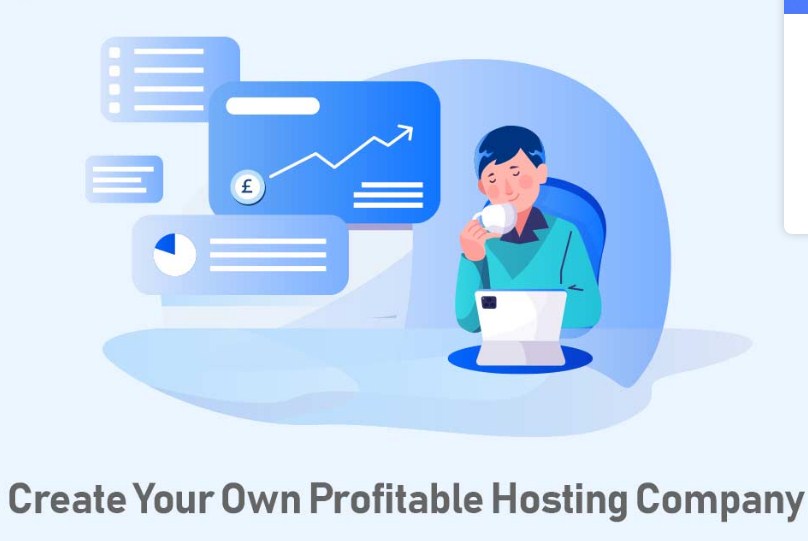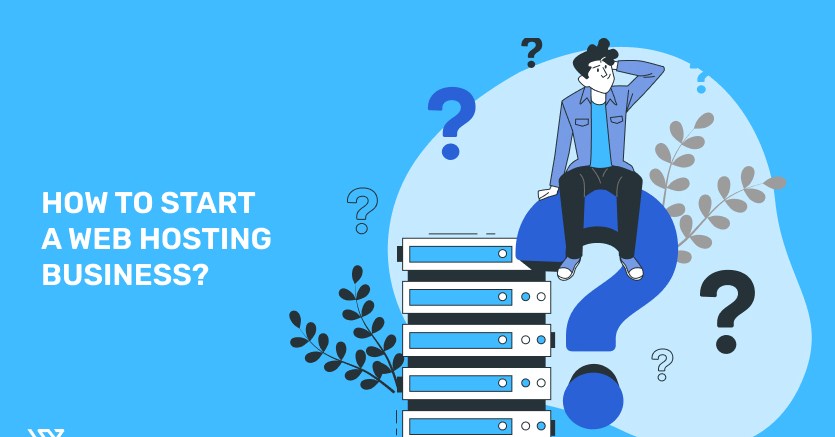Hosting Business A Deep Dive into the Potential – The web hosting industry has been booming for years, with businesses and individuals seeking reliable solutions to host their websites and online services. But is the web hosting business profitable in 2025?

In this article, we’ll dive deep into the financial potential of starting a web hosting business, what benefits it offers, and how you can tap into its profitability. We will also review the best web hosting products that will ensure your business success, compare their features, and provide actionable insights. 🌐
What Is Web Hosting, and Why Is It Important?
Web hosting refers to the service that allows businesses and individuals to store their websites on servers that are connected to the internet. Without web hosting, your website would not be accessible to anyone online. Hosting providers offer different types of hosting services like shared, dedicated, VPS (Virtual Private Server), and cloud hosting, each with its own features and pricing models.
For businesses, having a strong web presence is crucial. Without reliable web hosting, a website can experience downtime, slow loading times, and poor customer experiences. These issues can negatively impact profits and the reputation of a business.
The Profitability of a Web Hosting Business in 2025
Is Starting a Web Hosting Business Profitable?
Starting a web hosting business can be very profitable, but it’s important to understand the nuances involved. Here’s why it can be a lucrative venture:
- Ever-Increasing Demand: As more people and businesses move online, the demand for reliable web hosting services is growing. This trend shows no signs of slowing down, and it’s a great time to enter the market.
- Recurring Revenue: Web hosting businesses typically operate on subscription-based models, which means recurring monthly payments from clients. This can lead to a steady stream of income and long-term profitability.
- Scalability: As you acquire more customers, you can scale up your infrastructure and grow your business without significant overhead. Hosting companies can also offer additional services like domain registration, SSL certificates, and website development to increase revenue.
- Low Initial Investment: Compared to other industries, starting a web hosting business requires relatively low initial investment, especially if you opt for reseller hosting or affiliate marketing programs.
- Diversification of Services: Hosting companies often offer additional services like email hosting, cloud storage, and website development, increasing the avenues for revenue generation.
Key Benefits of Running a Web Hosting Business
Running a web hosting business is more than just a money-making venture. Here are some key benefits to consider:

1. Steady Cash Flow
Web hosting businesses benefit from predictable monthly revenue streams. Clients typically sign up for annual or monthly hosting plans, and this continuity ensures a consistent cash flow for your business.
2. Flexibility and Control
As the owner of a web hosting business, you control the pricing structure, types of hosting plans, and service offerings. This flexibility allows you to cater to different niches and target markets effectively.
3. Low Operating Costs
Once set up, running a web hosting business has relatively low operational costs. You can operate from anywhere with a strong internet connection and minimal staff, especially if you choose to resell hosting services through an established provider.
4. Global Reach
Since web hosting is a service that can be provided worldwide, you aren’t limited by geography. You can reach clients from different regions, offering them a global scope for your services.
Top 5 Web Hosting Providers for Your Business in 2025
Here are five web hosting providers that can power your business with reliable services. These options cater to different needs and budget ranges.
1. Bluehost
Best for: Small to Medium Businesses
Bluehost is one of the most popular hosting providers. Known for its affordability and reliability, it is especially well-suited for small and medium businesses.
| Use Case | Hosting Type | Pros | Cons | Price | Features |
|---|---|---|---|---|---|
| Ideal for businesses | Shared Hosting | Excellent uptime, great customer support | Limited scalability | From $2.95/mo | Free domain, 24/7 support, 50GB SSD Storage |
Why Use Bluehost:
Bluehost offers strong customer support, a user-friendly interface, and great uptime. It’s ideal for startups and small businesses looking to build a website quickly.
2. SiteGround
Best for: Website Speed and Performance
SiteGround is renowned for its excellent performance and speed, making it perfect for businesses that prioritize fast website load times.
| Use Case | Hosting Type | Pros | Cons | Price | Features |
|---|---|---|---|---|---|
| Best for eCommerce | Cloud Hosting | Top-tier speed, excellent customer service | Pricier than competitors | From $3.99/mo | Free CDN, 30-day backup, unlimited emails |
Why Use SiteGround:
Its exceptional speed and performance are why e-commerce businesses prefer SiteGround. The platform’s uptime is outstanding, and it integrates seamlessly with popular platforms like WordPress.
3. A2 Hosting
Best for: Speed and Developer Flexibility
A2 Hosting is known for its high-speed hosting solutions and developer-friendly features. It’s an excellent choice for tech-savvy individuals or businesses with complex hosting needs.
| Use Case | Hosting Type | Pros | Cons | Price | Features |
|---|---|---|---|---|---|
| Ideal for developers | VPS, Dedicated Hosting | Great speed, unlimited storage | Expensive for beginners | From $2.99/mo | Turbo boost, unlimited bandwidth |
Why Use A2 Hosting:
If you require enhanced speed and developer tools, A2 Hosting’s Turbo servers deliver excellent performance and customization options. It’s a premium service that ensures your site loads fast.
4. HostGator
Best for: Budget-Friendly Hosting
HostGator is perfect for businesses on a budget. It offers reliable services at an affordable price.
| Use Case | Hosting Type | Pros | Cons | Price | Features |
|---|---|---|---|---|---|
| Ideal for beginners | Shared Hosting | Affordable, 45-day money-back guarantee | Basic features on lowest plans | From $2.75/mo | Free website builder, 24/7 support |
Why Use HostGator:
HostGator’s affordable pricing makes it an excellent choice for individuals or small businesses who want reliable hosting on a budget.
5. InMotion Hosting
Best for: Business Growth and Scalability
InMotion Hosting is a solid choice for growing businesses that need scalability without compromising performance.
| Use Case | Hosting Type | Pros | Cons | Price | Features |
|---|---|---|---|---|---|
| Ideal for growing businesses | VPS, Dedicated Hosting | Excellent uptime, great scalability | More expensive for beginners | From $2.49/mo | Free SSDs, unlimited bandwidth |
Why Use InMotion Hosting:
InMotion Hosting is ideal for growing businesses that anticipate scaling their operations quickly. It offers great performance, uptime, and an array of plans.
How to Buy Web Hosting and Get Started
Where to Buy:
You can purchase hosting services directly from the websites of the providers listed above. Most providers offer simple sign-up processes that allow you to choose your hosting plan and complete the purchase.
How to Buy:
- Choose Your Plan: Select a plan based on your business needs (e.g., shared, VPS, or dedicated hosting).
- Sign Up: Fill out the required details, including domain name registration (if needed).
- Payment: Complete the payment process via secure methods such as credit card or PayPal.
- Set Up: Follow the onboarding process to set up your website.
5 Frequently Asked Questions (FAQs)
- What is the most profitable type of hosting to offer?
- VPS and dedicated hosting plans tend to be more profitable due to higher price points and the scalability options they offer.
- How much should I charge for web hosting?
- The price depends on the type of hosting, features, and market. Shared hosting may start as low as $2.95/month, while VPS hosting can range from $20 to $80/month.
- Can I start a web hosting business with no experience?
- Yes, you can! You can start by reselling hosting services from established providers or become an affiliate marketer. Learning the basics will help you scale.
- What are the risks of starting a web hosting business?
- Risks include the technical nature of the business, competition, and reliance on uptime and server performance. You’ll need good support and reliability.
- How do I attract customers to my web hosting business?
- Focus on excellent customer support, competitive pricing, and marketing strategies like SEO, content marketing, and social media.
Starting a web hosting business can be profitable and offer significant benefits for entrepreneurs who are ready to invest in the right tools and services. By choosing the right hosting provider and understanding the intricacies of the business, you can build a successful venture that meets the growing demand for online services.
Read More >>>
- Managed VPS Pricing: Find the Best Deals for Your Business in 2025 | Complete Guide
- Best Managed VPS Hosting with cPanel for 2025 | Secure, Reliable & Affordable